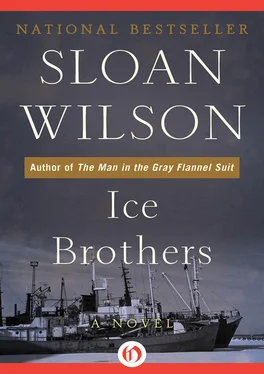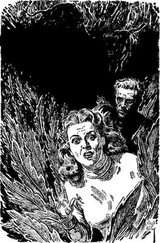The trouble was that Paul wanted to make money without becoming a businessman, which seemed to him to be a very boring fate. When he was sixteen he came across a book by Warwick Tompkins, who took college boys on long ocean cruises aboard the Wanderbird , a stately old pilot boat, and at the Boston Yacht Club, he actually met Irving Johnson, who was doing the same thing with the clipper-bowed schooner Yankee . Here were men who were sailing the world and getting their crew to pay the expenses! They were adventurers who found ways to make money by doing exactly what they wanted during their best years instead of spending a lifetime at dull jobs with the hope of escape during their old age.
Because of these men Paul began to dream and his dreams seemed to him to be practical. Somehow he would earn enough money to fix up his father’s old yawl, and would find college students to serve as a paying crew during short summer cruises. After he graduated from college, he would take such a crew around the world, just like Warwick Tompkins and Irving Johnson.
When Paul’s older brother realized that it actually might be possible to make a little money running cruises to Gloucester, Nantucket, and Provincetown, and that the old yawl was a wonderful place for parties, he helped, and their father was also delighted to find a way to avoid selling the Valkyrie . They made the first stage of Paul’s dream a family project, and he rarely discussed the later stages he had in mind with anyone.
Except Sylvia. When he first met her, she was sixteen and he was seventeen, and he had the old yawl moored off the end of the yacht club pier while he and his brother were readying her for their first cruise to Nantucket.
“Is that your boat out there?” she asked when he rowed the dinghy to the float.
“Yes,” he said with the deep pride which the old yawl always gave him. At sixteen, Sylvia was already a vividly pretty young woman who usually danced with the older boys and she never before had paid any attention to him. She was wearing a green bathing suit and he was afraid to look at her for more than a moment.
“Could that boat cross an ocean?”
“You bet. I’m going to sail her around the world.”
Tossing up her chin, she laughed. “When?”
“As soon as I get out of college,” he said, although he had not yet graduated from high school.
She grinned, and there was that wildness in her eyes which seemed to make anything possible. “Will you take me with you?”
“It’s a date,” he said. “Would you like to go out and take a look at her first?”
He was aware from the beginning that Sylvia did not know anything about boats and scorned the discomforts of the sea, but he sensed that she was an adventurer, a rebel like him. The first hour she was aboard the Valkyrie , she went scampering up the rigging and stood poised on the crosstrees, balancing with one hand on a shroud.
“Be careful!” he shouted.
“Come on up! I can see the whole harbor.”
Much as he loved boats, he had always been afraid of heights, but he mustered the courage to climb the rigging and stand on the other side of the crosstrees. The view was indeed grand up there fifty feet above the deck if he didn’t look down.
“Have you ever dived from here?” she asked.
“No!”
“The top board on the club tower is almost this high.”
“But here you might fall before you got clear.”
She smiled and there was that look in her eyes again when she said, “I dare you!”
“Don’t, I—”
Before he could say more she launched herself into the air and swooped toward the metallic surface of the water, her arms outstretched. His mixture of anger and admiration turned to fear when he realized that she was not really a very good diver. She hit much too flat, and when the explosion of foam fell around her, he saw her come slowly to the surface, looking wounded, out of breath and scared. Forgetting his own safety, he jumped, pushing himself off the rigging more effectively than he could in a dive. Plummeting into the water a dozen feet from her, he swam rapidly toward her. She had recovered her breath and was laughing.
“You looked so funny,” she said. “All the time you were falling, your arms and legs were moving as though you were trying to climb up!”
He had been angry at her and totally unable to resist her. That’s the way he had stayed, year after year.
One of the confusing things about Sylvia was that despite her wild ways, she was in certain matters very conventional.
In public she played a teasing game, but in private she was scared and angry when he tried to go beyond a kiss. When at the age of seventeen he couldn’t stop himself from telling her that he loved her, she said she loved him too, but her family would be furious if she paid too much attention to any one boy. They were, she pointed out with perfect logic, much too young even to dream about getting engaged. If he had any idea of getting married even in the distant future, he should start thinking of doing something more substantial with his life than sailing an old yawl around the world.
He realized that if he seriously wanted to pursue his dream, he should forget her, but that was impossible — when he came right down to it, he had to admit that even if he had to take a dull job, life with Sylvia offered more excitement than even a voyage around the world without her. When he failed to get into Harvard College he felt terrible, especially since he knew that she went to almost all the dances there. He enrolled in Boston University instead of Columbia, which had accepted him, because he couldn’t stand the thought of leaving her.
Paul’s brother, Bill, often made fun of his obsession with Sylvia.
“You’re going to get nothing but trouble from her,” he said. “Right now she’s a cockteaser, damn near the queen of that whole sorry tribe. In a year or two she’ll start putting out, but not for a poor slob like you who’s been running after her forever. She’ll put out for some guy she thinks she can’t get any other way, some smart bastard who won’t fall for her line of crap.”
Paul hated his brother for saying that but was afraid that he was right. He also suspected that Bill might have some hope of being the smart bastard he’d described. Bill never asked Sylvia to go out, but he often cut in on her at dances, and prided himself on insulting her whenever possible.
“Sylvia, you’re not as pretty as you think,” Bill said one night when Sylvia arrived at a yacht club dance, resplendent in a new silver evening gown.
“I bet you say that to all the girls,” she replied with a smile. “Good old Bill always has a surly word for everyone.”
“Ah, but my insults are sincere,” Bill said. “You can’t accuse me of saying things I don’t really mean.”
At this point Paul cut in on them.
“Take her, she’s all yours,” Bill said, and strode away with a laugh.
“I apologize for him,” Paul began.
“Don’t bother. Your brother thinks that insults are charming. He’s doing his poor best to please.”
In her eighteenth year something seemed to happen to Sylvia. She lost much of her self-confidence. Perhaps she found that the precocious exuberance which had brought her so much attention in her early teens didn’t work so well at the big coming-out parties to which she was invited because her parents had managed to get her on the proper lists, despite the fact that she had not made a formal debut. Boston society had a way of putting down the daughters of the newly rich, especially when they weren’t so very rich, and Sylvia’s manners were not calculated to impress the old guard. Instead of toning herself down, she became more flamboyant than ever. It was at this time that she began drinking so much at cocktail parties that Paul began to worry about her. Once she fell while trying to climb up on a marble coffee table to demonstrate some sort of dance, and the laughter was not entirely friendly as Paul helped her out to his car. She cried all the way home.
Читать дальше












